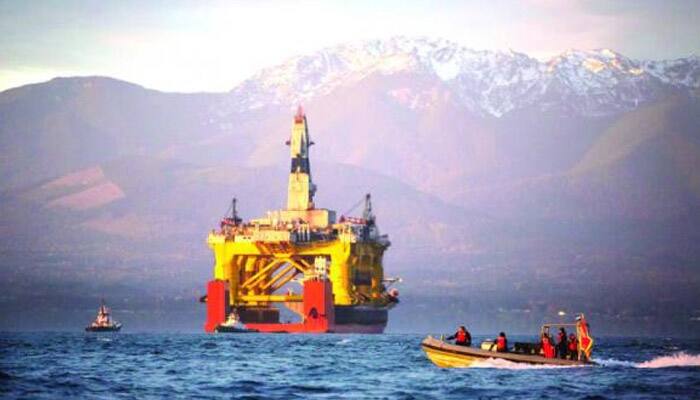London: Shell said on Monday it was halting its controversial offshore exploration in Alaska after failing to find sufficient quantities of oil and gas.
The Anglo-Dutch energy giant said in a statement that its Burger J well in the Chukchi Sea, off the northwest coast of Alaska, did not warrant further exploration, adding it would now stop its activities in Alaskan waters.
Royal Dutch Shell began drilling there in July, two months after US President Barack Obama approved Arctic drilling, despite opposition from environmentalists.
"Shell has found indications of oil and gas in the Burger J well, but these are not sufficient to warrant further exploration in the Burger prospect," the London-listed energy major said in the statement.
"The well will be sealed and abandoned in accordance with US regulations," the statement said, adding: "Shell will now cease further exploration activity in offshore Alaska for the foreseeable future."
Shell cited "the high costs associated with the project" and the "challenging and unpredictable federal regulatory environment in offshore Alaska" among the other factors behind its decision.
The company drilled to a depth of 6,800 feet (2,070 metres) at the Burger J well, which is located about 150 miles (240 kilometres) from the town of Barrow.
"For an area equivalent to half the size of the Gulf of Mexico, this basin remains substantially under-explored," it added.
Justifying his move to allow Shell to drill in the area, Obama had described US oil production as an "important" source of energy.
Greenpeace said the authorization to drill in the region was a "terrible mistake" that could damage the fragile Arctic environment and potentially spark an ecological disaster, along the lines of the devastating 2010 Gulf of Mexico oil spill.
Environmental groups oppose drilling in the Arctic due to the vulnerability of animals already struggling to survive because of melting sea ice, as well as risk that a spill could pose to the region.
Greenpeace had vowed to fight Shell and urged Obama to stop the firm`s exploration activities in the area.
Shell said Monday that Alaska was still of major importance for US energy supply, but added it was disappointed with its exploration results."The Shell Alaska team has operated safely and exceptionally well in every aspect of this year`s exploration program," said Marvin Odum, director of Shell Upstream Americas.
"Shell continues to see important exploration potential in the basin, and the area is likely to ultimately be of strategic importance to Alaska and the US.
"However, this is a clearly disappointing exploration outcome for this part of the basin."
Some Americans grew increasingly wary of drilling after the April 2010 explosion of BP-leased Deepwater Horizon in the Gulf of Mexico, which killed 11 people and spewed 4.9 million barrels of oil into the ocean.
Shell had previously put its Alaskan drilling plans on hold in 2013 after multiple embarrassing problems with its two rigs.
One, the Kulluk, washed ashore after breaking loose from towing vessels in stormy seas in southern Alaska in January that year.
Another, the Noble Discoverer, was recently cited by the US Coast Guard for numerous safety and operational deficiencies. Both rigs were sent to Asia for repair and maintenance work.
The US Geological Survey said in 2008 that within the Arctic circle there are 90 billion barrels of oil and vast quantities of natural gas waiting to be tapped, most of it offshore.
















